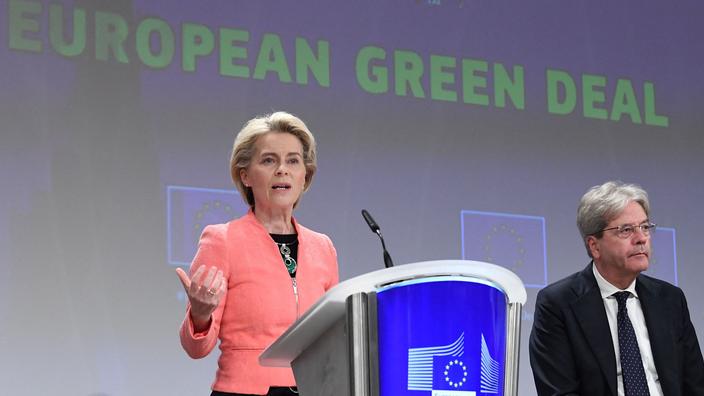Taxing kerosene, "
allowed to pollute
" for fuel suppliers, reduction to zero of CO2 emissions from new cars, border tax ... The European Commission is releasing heavy artillery on Wednesday against atmospheric pollution.
First targets: vehicles with gasoline and diesel engines.
CO2 emissions will have to be reduced to zero by 2035, effectively stopping these vehicles in favor of electric motors.
The measure should help achieve the EU's climate objectives, but "
it will also benefit citizens by reducing energy costs and improving air quality
," said the European Commission.
The automotive industry is however worried about a lack of charging stations and an industrial transformation that could cause a haemorrhage of jobs.
Read also: Ecological transition: Macron receives the automotive industry on Monday, which will need 17 billion euros
A tax on kerosene
In a second step, the Commission proposed Wednesday to gradually tax kerosene for flights within the EU in order to reduce emissions from the sector, while aviation fuel has so far benefited from a complete exemption.
Read also: Climate: the EU wants to make air traffic pay for its carbon emissions
This tax, which would save business aviation and freight, would be phased in over ten years, while the minimum target for the use of biofuels in airplanes would be raised and the
free "
polluting permits
" enjoyed by the sector would disappear. from 2026, according to this project.
Companies are alarmed at the risk of a "
distortion of competition
" with the rest of the world.
A second European carbon market
The European Commission has also proposed to create a second European carbon market, where suppliers of fuel for road transport or domestic fuel for residential heating will have to buy “
polluting permits
” to offset their emissions.
Read also: Climate: Europe toughens its tone, the price of carbon soars
This project, which will be the subject of bitter discussions with MEPs and Member States, is already contested by elected officials of all stripes and environmental NGOs who point to the risk of social injustice and the "
yellow vests effect
". the foreseeable increase in household bills.
A border tax to fight against global warming
Finally, the Commission has proposed to subject EU imports in five highly polluting sectors to the same rules as for European production, by gradually requiring them to purchase
carbon “
emission certificates
”.
Read also: Can the “carbon tax” at borders be useful for the climate?
In these sectors (steel, aluminum, cement, fertilizer, electricity), this adjustment mechanism - where importers will eventually have to pay the same carbon compensation as for goods produced in the EU - will be gradually implemented between 2026 and 2036, according to the project of the European executive

